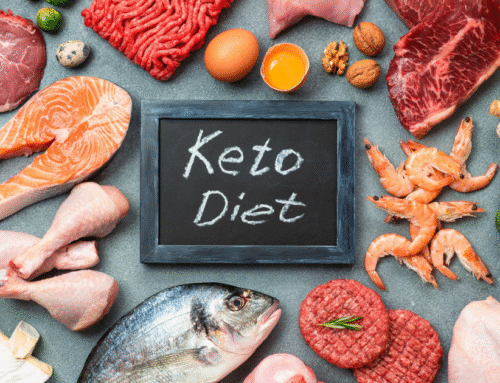The link between what we eat and our health has captured interest for ages. Different cultures have identified certain foods as key to a long life. Stambler studied these “longevity foods,” showing how items like honey and herbs were seen as important for a long life worldwide.1
Looking closer at why we choose certain foods, Leng and others found it’s not just about taste. Our choice of meals is influenced by our biology, society, and culture. Monterrosa also noted how crucial it is to consider these influences for lasting healthy diets.1
Key Takeaways : The Science Of Diet
- Certain “longevity foods” have been associated with longevity across cultures and time periods.
- The determinants of food choice involve a complex interplay of biological, social, and cultural factors.
- Understanding sociocultural influences is crucial for promoting sustainable healthy dietary patterns.
- Nutrition plays a critical role in the aging process and longevity.
- Dietary interventions like intermittent fasting can activate hormetic stress response pathways, leading to improved cellular function and longevity.
Introduction to Dietary Science
Dietary science looks at how what we eat affects our health and life. It covers everything from foods linked to living longer in the past to how cultural and social aspects affect what we eat today. This part gives a broad look at the core beliefs of diet science.
Longevity Foods in History and Myth
Stambler found that foods like honey and certain herbs have been tied to living longer in many cultures and stories.2 These special foods often carried deep meanings, showing people’s age-old interest in how food affects life span.
The Determinants of Food Choice
Leng and his team show that our food choices are shaped by many things, like our biology, society, and culture.2 Knowing what influences our choices helps make healthy diets that last and deal with the many factors affecting what we eat.
Sociocultural Influences on Food Choices
Monterrosa and his research stress how important it is to look at social and cultural aspects when understanding why we eat what we do.2 This knowledge is key to making better eating habits and lasting changes in our diets.
Nutrition and Healthy Aging

The Role of Diet in Aging and Longevity
The global population is getting older. People over 65 and 80 are growing the most, says the United Nations3. Nutrition is key for staying healthy as we grow older. Research by Rattan and Kaur shows how what we eat affects how we age.4
Eating a wide variety of foods can help keep us healthy as we age. Studies show that those who eat many different foods are less likely to become frail4. They also suggest that varied diets help keep people vital.4 Eating lots of fruits and veggies could even slow down how quickly our cells age. This could help us live longer.4
The Mediterranean diet, for example, could make it less likely for older folks to become frail4. Eating habits might affect frailty differently depending on where people live. For example, old folks in Korea feel the impact of their diets in various ways.4
Not just the variety, but also what specific nutrients we get is important. The food we eat affects our memory, especially for older U.S. adults4. Eating seafood may help prevent certain diseases. This is important for adult health. Nutrients are also key in preventing muscle loss in Arab men.4
However, it’s hard for older adults to always eat right. This is shown by the risk of not getting enough to eat in older Mexican adults.4 Yet, there is hope. New ways of eating, like adding probiotics or cutting calories, could help make things better. They might deal with the effects of aging and nutrition.43
Challenges and Perspectives in Biogerontology
Biogerontology keeps looking ahead. It aims to understand better how food and staying active help people avoid being frail. The FINE study is about teaching nutrition and exercise to those almost frail, to help them stay strong.4
There’s still more to learn in how food affects aging.3 We need these new studies to give us better advice on what to eat as we get older, to stay healthy and live longer. This information will help doctors and leaders make better food suggestions, so we can have the best health possible in our later years.
Dietary Interventions and Hormesis

New research shows what hormesis means. It says small stresses can actually help us be healthier. This idea is big for how we eat and might help us age slower.5
Intermittent Dietary Restriction
Sharma and Kaur’s work explains the good side of eating less sometimes.5 This includes things like eating fewer calories or not eating for some time. It can make our cells work better and last longer.5
Hormetic Stress Pathways
Less food can make our bodies handle stress better. This has been seen in animals, where they lived longer and got sick less from eating less. It’s because their bodies made more protective substances.5
Gentle stress can even make our cells produce things that prevent harm. And, it might lower the chance of getting certain diseases.5
Hormetins: Anti-Aging Drugs from Dietary Compounds
Some foods act like anti-aging drugs if we eat them in the right amount.6 An example is TCDD, found in herbicides and car exhaust. It’s usually bad for us but can help fight cancer in small amounts.6
Other research shows that eating at certain times might not change our weight much. This was seen in healthy, active men who ate in a limited time window for four weeks.7
Looking at how less food or certain foods help us live longer is exciting. It could guide us on how to eat better for a longer, healthier life.567
The Science Of Diet

The study of diet and human health has grown a lot. It looks at many scientific findings and ways to eat well. We’ve learned a lot about how what we eat affects our health over time.8
Some key studies have shown the good of different diets. For example, the Mediterranean diet is linked with less heart disease, diabetes, and more. The DASH diet helps lower blood pressure and reduce heart failure risk. And the Nordic diet may prevent stroke and help with losing weight.8 Intermittent fasting is also getting attention. It’s8 said to lower blood sugar, cut down on inflammation, make your metabolism better, and even boost your brain power.8
The Harvard Healthy Eating Plate offers a simple way to eat healthily. It suggests a mix of whole grains, good protein, lots of veggies, and some fruits.8 This approach stresses eating foods in their natural state to be healthier.
| Dietary Pattern | Key Benefits |
|---|---|
| Mediterranean-style diet | Lower risk of heart disease, diabetes, depression, and certain cancers8 |
| DASH diet | Effective for lowering blood pressure and decreasing the risk of heart failure8 |
| Nordic diet | Supports prevention of stroke and aids in weight loss8 |
| Intermittent fasting | Linked to lower blood sugar, reduced inflammation, improved metabolism, and enhanced brain function8 |
| Harvard Healthy Eating Plate | Recommends balanced proportions of whole grains, healthy protein, vegetables, and fruit8 |
The science behind diet keeps getting better. It helps us see how food and health are linked. Knowing this, we can choose what to eat wisely for a healthier life.9
Malnutrition and Dietary Challenges in Older Adults
As people grow older, they face a variety of challenges with what they eat. This can really affect their health and happiness. Research by Christmas and Rogus-Pulia shows that as we age, it can get harder to eat and enjoy food. This is because our bodies change.10
Swallowing Disorders and Sensory Changes
Older adults can have trouble eating, known as dysphagia, which can lead to not getting enough nutrients. Changes in how we taste and smell can also make food less appealing. This makes it harder for them to eat right, risking malnutrition.10
Metformin and Vitamin B12 Deficiency
Some medicines can lead to not getting enough of certain nutrients. For instance, the diabetes drug metformin can lower vitamin B12 levels. This is a serious issue if it’s not managed.11
Anorexia of Aging and Associated Comorbidities
With age, some people may naturally lose their appetite and eat less. This “anorexia of aging” can cause nutritional problems and raise the risk of other health issues like muscle loss and frailty.11
Tackling these eating problems in the old is very important. Malnutrition is a big deal for public health. It costs over $51 billion a year in the U.S. just for the medical issues related to it. Surprisingly, up to 65% of older folks in hospitals might face this issue too. ASPEN and Defeat Malnutrition Today are working hard to improve care. They push for more screening and help to fight this important battle.10
Plant-Based Diets and Brain Health

The effects of plant-based diets on our bodies and brains are being carefully studied. Medawar et al. have looked into this in depth. They found that these diets might be really good for our thinking and our nervous system.12 Their work explains how the stuff in plant foods might help our brains work better.
A research team tested what a plant-heavy diet could do for our brains over nearly a year and a half.12 They checked out 300 people. These folks ate walnuts, a lot of green tea, and a shake loaded with the Wolffia globose plant.12 This mix was full of things your brain likes. They saw that losing just a little weight can make your brain appear younger.12
Walnuts can make you feel less stressed and sleep better, especially if you’re a student.12 And eating certain mushrooms, like lion’s mane, might help your brain cells grow and improve how you remember things.12 There’s also evidence that eating a lot of fruits and veggies can make your memory stronger for longer.12
Eating lots of plant foods can be a big win for your heart, keep cancer away, and get you fitter.12 Studies show that diets with plenty of fruits, veggies, and whole grains are great for how your body works. They can even help you be as fit as if you walked 4,000 more steps every day.12
Healthy Dietary Patterns for Longevity

Nutrition has a big impact on our health and how long we live. Research shows eating certain foods can make us healthier and live longer. The Mediterranean and DASH diets are good examples of ones that work well. They help lower the risks of getting sick often.13
The best diet is one that promotes overall health, weight management, and cognitive health. The MIND diet, combining elements of the Mediterranean and DASH diets, focuses on foods that positively positively influence health and potentially delay neurodegenerative diseases. The New Nordic Diet better than any other diet emphasizes whole grains, fatty fish, and root vegetables, offering a fresh approach to healthy eating. Mediterranean-style diets, rich in healthy fats like extra-virgin olive oil and low in red meat and sugar, are associated with a lower risk of cardiovascular disease and cancer. Research from the University of Sydney’s Charles Perkins Centre highlights the benefits of these diets for human keto diet. Unlike unhealthy diets high in processed foods, these balanced diet and exercise approaches promote health and weight management. No single diet fits all, but those rich in a variety of fruits, vegetables, lean proteins, and healthy fats can reduce the risk of diabetes, hypertension, and excess weight. Scientific literature supports that eating well, combined with regular exercise, is crucial for a healthy lifestyle diet features.
The Mediterranean and DASH Diets
The Mediterranean diet is all about eating lots of plant foods and not too much animal food. It’s very good for you. People who follow this diet closely have a lower chance of dying early from any cause.13 The DASH diet focuses on fruits, veggies, whole grains, and little fat dairy. It has been found to lower the risk of deadly heart and cancer diseases.13
Sirtfoods and Functional Foods
There are also new diets being looked into, like the Sirtfoods diet. This diet says that foods like red wine, dark chocolate, and certain herbs can help keep our cells healthy.14 Things like fermented foods, prebiotics, and probiotics are good for the gut and help fight inflammation, which can prevent aging problems.14
Dairy Products and Longevity
Dairy foods have also been tied to living longer. Dairy in your diet can lower the chances of getting brain diseases.13 Plus, having the right amount of protein, from sources like dairy, is good for not overeating as we get older.14
Eating the right way and choosing certain foods can really help us live better and longer. The key is to eat a variety of foods that are very good for us. Keeping up with what science tells us about food is important for healthy aging. By making smart choices, we can make a big difference for our health and how we age.
Time-Restricted Feeding and Meal Timing

Recent studies highlight time-restricted feeding’s promising outcomes. This method limits eating to certain hours of the day. The study by Currenti et al. looks into how this helps older adults’ cognitive health.15
Intermittent Fasting and Metabolic Health
Intermittent fasting and eating within specific hours may improve metabolism. They cut the chances of metabolic diseases and boost heart health. For example, obese participants lost about seven pounds in 12 weeks by eating only between 10:00 a.m. and 6:00 p.m.15
Also, this approach enhances the body’s reaction to insulin, decreases high blood pressure, and lessens harmful stress in men with prediabetes.16
Meal Frequency and Disease Risk
How often and when we eat impacts our health risks. Research shows most people eat every 3 hours over 15 hours, with few going 12 hours without food.15
When a group stopped eating from 7:00 p.m. to 6:00 a.m. for two weeks, they lost a pound weekly versus no restrictions.15 Plus, morning calories add less weight than evening calories. A diet with a larger breakfast also promotes better weight loss than one with a bigger dinner.15 The study indicates meal timing influences our metabolism and risk of illness.
The Role of Gut Microbiome in Aging

In 2020, Nutrients published an article that highlighted the importance of the gut microbiome in aging and long life.17 The human gut contains about 2,000 kinds of bacteria. They may even be more than our own cells and genes.18 This mix greatly affects how our bodies work and our risk for health issues as we get older.
Probiotics and Prebiotics for Longevity
Experts have been looking into how probiotics and prebiotics might help us age well. In 2021, Grabowska and others studied this.19 They found that what we eat and where we grew up play a big role in the types of bacteria we have.19 This suggests that certain foods or supplements could help keep our guts healthy as we get older.
Gut Microbiome and Cellular Senescence
Our gut’s bacteria is also connected to how our cells age. A study by Derrien and his team in 2017 brought up a bacteria called Akkermansia muciniphila. They believe it might affect how we age.19 Another study in 2018, by Ticinesi and team, looked at gut bacteria and brain health in older people. It hinted at a connection between gut health and how our brain ages.19 These studies show that keeping our gut bacteria diverse and balanced could help us age healthily.
Our lifestyle, like what we eat and how active we are, really matters for our gut bacteria as we age.18 In 2021, Zhong and his team looked at what happens to the gut bacteria of older women who started to exercise.19 They found that exercise had a positive effect on their gut health. Understanding how our lifestyle affects our gut as we get older is key to staying healthy.
| Study | Key Findings |
|---|---|
| De la Cuesta-Zuluaga et al. (2019) | Found age and sex-dependent patterns of gut microbial diversity in human adults.19 |
| Yatsunenko et al. (2012) | Dug into the human gut microbiome based on age and where people are from. They noticed different bacteria at different life stages.19 |
| Grabowska et al. (2021) | Explored the probiotic and prebiotic potentials for longevity and cellular senescence associated with the gut microbiome.19 |
| Sepp et al. (2022) | Looked at the gut bacteria of people over 100 versus younger people. They showed how what we eat and our early life impact our gut bacteria.19 |
| Derrien et al. (2017) | Talked about Akkermansia muciniphila’s possible effect on how we age.19 |
| Ticinesi et al. (2018) | Reviewed gut bacteria and brain health in the elderly. They found a clue that gut health and cognitive health might be linked in older people.19 |
| Zhong et al. (2021) | Studied how 8 weeks of exercise affected the gut bacteria of older women who didn’t exercise much. They found exercise could help the gut.19 |
Anti-Inflammatory Diets and Inflammaging

A recent review by Koppula et al. explores how our diet affects “inflammaging,” the process of aging connected to inflammation. This work brings up how obesity links to constant, low-level inflammation. The liver plays a big part by secreting hepcidin because of metabolic troubles. M1 macrophages are key players in causing this inflammation. They react to lipopolysaccharides (LPS) by producing pro-inflammatory cytokines like IL-6, IL-1, and TNF-α.20
There are various causes of age-related inflammation. These include our genes, ongoing infections, changes in our gut health, and being overweight.20 Changes in the way our genes are expressed (through epigenetic changes) are also tied to health issues related to aging. This can include shifts in DNA, histone proteins, and miRNAs.20
The Mediterranean diet (MD) is well known for helping people keep a healthy weight and avoid obesity.20 A study by Santoro et al. in 2014 showed that the MD could also lower “inflammaging” in older adults.21 This diet is rich in polyphenols which come from foods like veggies, fruits, whole grains, nuts, and olive oil. These foods are great at preventing the kind of illnesses that last a long time and don’t spread from person to person.20
Looking at how food affects inflammation in young people, Bujtor et al. did a research review in 2021. They found that what kids eat can show in their inflammation markers.21 Then, Gleeson and Morawin, in 2011 and 2021, showed how doing sports can fight inflammation. It helps the immune system fight diseases and keeps it from wearing out too early.21
The Dietary Inflammatory Index, made by Shivappa et al. in 2014, helps us see how our eating habits might cause inflammation.22 Over the years, many researchers, from Keys in 1986 to Meslier in 2020, have praised the Mediterranean diet for its anti-inflammatory effects. They’ve shown it can stop heart diseases before they start. Plus, it’s good for keeping your metabolism, gut, and joints healthy.22
Also Read: Hormone Balancing Diet: Your Path To Wellness
Conclusion
The field of diet and nutrition shows us how our food choices affect our health and how long we live. It’s clear that what and how we eat is linked to our well-being by many complex factors.23
Exploring the connection between certain foods and their cultural meanings reveals a lot. We also see how changing what we eat can slow aging through hormetic stress responses. Nutrition is key to staying healthy as we age.23
Understanding nutrition is hard for many, with 80 percent feeling lost about it, says a survey.9 But, some things are agreed upon by experts. These include the goodness of diets rich in plants, the need to cut down on overly processed foods, and the health benefits of some fats.9
As we learn more about how food influences our gut bacteria and aging of our cells, exciting opportunities emerge. The idea of anti-inflammatory diets fighting “inflammaging” gives hope for a healthier future.23 We’re moving towards diets that really benefit us, supporting better health and a longer life.9
FAQs
Q: What is a healthy diet and how does it impact health?
A: A healthy diet includes a balance of fruits, vegetables, whole grains, lean proteins, and healthy fats. It provides essential nutrients to the body, supports overall health, and reduces the risk of various diseases like cardiovascular disease and hypertension.
Q: Can changing my style of eating help me lose weight?
A: Yes, adopting a healthier style of eating can help with weight loss. Choosing a diet rich in fruits, vegetables, and whole grains while limiting processed foods and sugars can aid in weight management.
Q: What is the best diet for weight loss?
A: The best diet for weight loss is one that is sustainable and balanced. Diets like the Mediterranean style or the DASH diet have been shown to be effective in promoting weight loss and improving overall health.
Q: How does a high-fat diet impact health?
A: Consuming a high-fat diet, especially one high in unhealthy fats like saturated and trans fats, can increase the risk of cardiovascular disease, hypertension, and obesity. It is important to choose healthy fats like those found in nuts, seeds, and avocados.
Q: Can diet play a role in the prevention of diseases like dementia?
A: Yes, research suggests that following a healthy diet rich in fruits, vegetables, and omega-3 fatty acids can positively influence brain health and reduce the risk of cognitive decline and dementia.
Q: What are some common components of weight loss diets?
A: Weight loss diets often include elements like reducing calorie intake, increasing physical activity, focusing on whole foods, limiting processed foods, and paying attention to portion control.
Q: How can dietary approaches like the Mediterranean style diet benefit overall health?
A: The Mediterranean style diet emphasizes whole grains, fruits, vegetables, lean proteins, and healthy fats like olive oil and nuts. This way of eating has been linked to improved heart health, weight management, and overall wellbeing.
Source Links
- https://www.ncbi.nlm.nih.gov/pmc/articles/PMC9785741/
- https://www.uml.edu/health-sciences/biomedical-nutritional/programs/undergraduate/what-is-nutritional-sciences.aspx
- https://www.mdpi.com/2072-6643/14/1/190
- https://www.ncbi.nlm.nih.gov/pmc/articles/PMC8746852/
- https://www.ncbi.nlm.nih.gov/pmc/articles/PMC2253665/
- https://www.ncbi.nlm.nih.gov/pmc/articles/PMC2836150/
- https://www.sciencedirect.com/science/article/abs/pii/S1568163707000451
- https://www.health.harvard.edu/topics/diet-and-weight-loss
- https://www.nbcnews.com/better/lifestyle/what-science-says-about-best-way-eat-what-we-re-ncna1104911
- https://www.agingresearch.org/our-initiatives/malnutrition-in-older-adults/
- https://www.ncbi.nlm.nih.gov/pmc/articles/PMC8399049/
- https://vegnews.com/2023/6/plant-forward-diet-younger-brain
- https://www.ama-assn.org/delivering-care/public-health/diet-patterns-can-boost-longevity-cut-chronic-disease
- https://www.ncbi.nlm.nih.gov/pmc/articles/PMC8879056/
- https://nutritionfacts.org/blog/what-the-science-says-about-time-restricted-eating/
- https://www.ncbi.nlm.nih.gov/pmc/articles/PMC9156382/
- https://www.ncbi.nlm.nih.gov/pmc/articles/PMC10149677/
- https://www.nature.com/articles/s41575-022-00605-x
- https://www.ncbi.nlm.nih.gov/pmc/articles/PMC9818603/
- https://www.mdpi.com/2072-6643/16/9/1286
- https://www.ncbi.nlm.nih.gov/pmc/articles/PMC8621229/
- https://www.ncbi.nlm.nih.gov/pmc/articles/PMC8389628/
- https://www.ncbi.nlm.nih.gov/pmc/articles/PMC7071223/








Leave A Comment